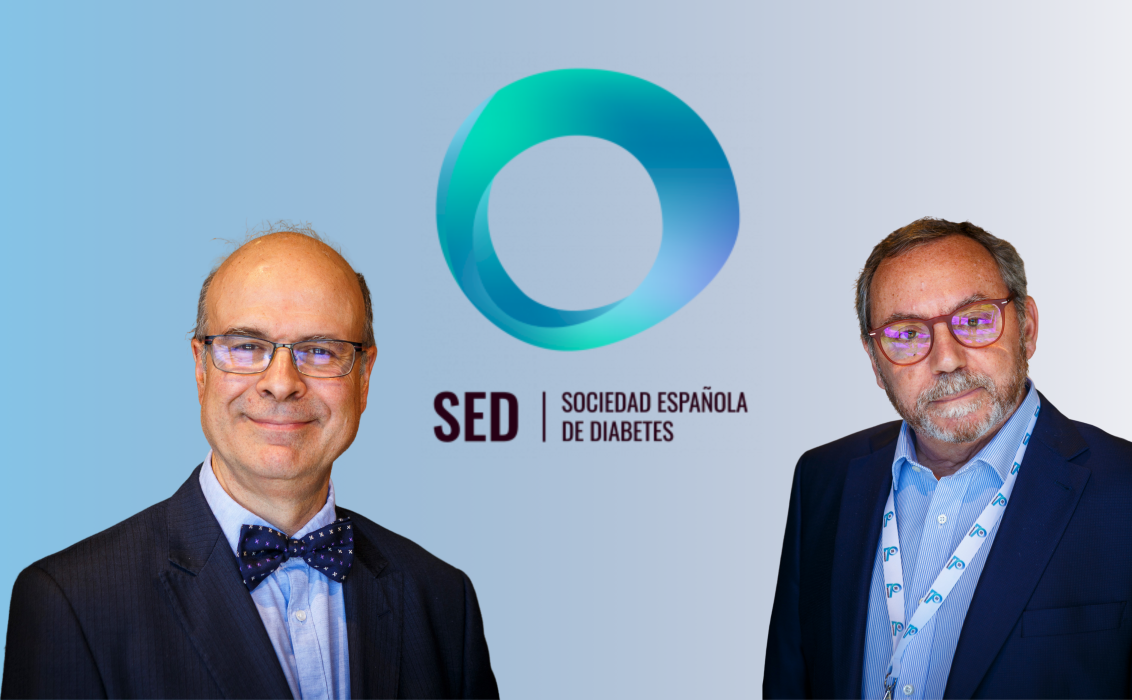In April 2024, during the XXXV Congress of the Spanish Diabetes Society (SED), Dr. Francisco Javier Ampudia-Blasco was appointed as the new SED President, succeeding Dr. Antonio Pérez Pérez.
Dr. Antonio Pérez Pérez (MD, PhD) is the director of the Nutrition and Metabolism Unit and senior consultant at the Endocrinology and Nutrition Department of the Hospital de la Santa Creu i Sant Pau in Barcelona, Spain. He is an associate Professor at the Autonomous University of Barcelona (UAB) and a member of the CIBER for Diabetes and Metabolic Diseases (CIBERDEM). Dr. Pérez’s main areas of interest include the pathophysiology, evaluation, and treatment of diabetes, dyslipidemia, obesity, and their complications, particularly in relation to the assessment and reduction of cardiovascular risk. Dr. Pérez has authored or co-authored nearly 400 peer-reviewed manuscripts, reviews, and editorials, and has received the Jose Antonio Hedo Prize for young Spanish researchers and the Rodríguez Miñón Prize for senior Spanish researchers from the Foundation of the Spanish Diabetes Society (FSED).
Dr. Pérez served as SED President from 2020 to 2024. Prior to that, he was SED Vice President and will serve as the president of Fundación SED from 2024 to 2026. During his four-year presidency, SED membership increased by nearly 1,000 members, reaching 3,140 in December 2023. Significant economic growth and financial stability were achieved through the creation of strategic partnerships and collaborations, as well as the modification of the statutes of both the Spanish Diabetes Society (SED) and its Foundation (FSED). Under his leadership, numerous activities were carried out, including continuing education programs, initiatives for diabetes care delivery, and the promotion and support of collaborative research projects with other scientific medical societies, patient organizations, and the Ministry of Health. Notably, this included the establishment of the first Spanish registry for Type 1 diabetes.
The new SED President, Dr. Ampudia-Blasco, holds a degree in Medicine and Surgery from the University of Valencia and a Doctorate in Medicine from the Autonomous University of Barcelona. He trained in Endocrinology and Nutrition at Hospital de Santa Cruz y San Pablo in Barcelona. He currently serves as Head of Section in the Department of Endocrinology and Nutrition at the University Clinical Hospital of Valencia, as Professor in the Department of Medicine at the Faculty of Medicine of the University of Valencia, and as researcher at CIBERDEM.
Dr. Ampudia-Blasco has received several grants and awards, including a research stay at the Abteilung für Stoffwechsel und Ernährung, MNR Klinik und Poliklinik der Heinrich-Heine Universität, Düsseldorf (under Prof. Michael Berger, 1992-1994). He is the author of numerous original works and book chapters, and has co-edited several monographs and books. From 2005 to 2010, he was the Director of ‘Avances en Diabetología’, the official journal of the SED. Currently, he serves as a reviewer for several prominent national and international scientific journals in the field.
As the new President of SED, Dr. Ampudia-Blasco’s primary objective is to expand SED’s international presence through more intensive collaborative efforts with related societies in Europe, the United States, Canada, and other countries. This will create new opportunities for young researchers and practitioners, undoubtedly benefiting the field of diabetology in Spain. He emphasises that basic and translational research should be the focus for the future of diabetes.
Additionally, Dr. Ampudia-Blasco aims to enhance the role of other groups within the society in training activities, such as therapeutic education professionals, family and community medicine practitioners and internal medicine specialists. He also stresses the importance of joint projects with people living with diabetes to improve their care and ensure equitable access to scientific advances in this field across Spain.
